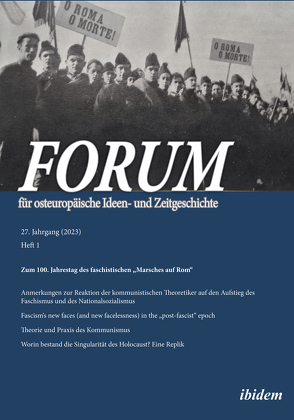
[Over] the last decade there has emerged a growing explicit (theoretically formulated) or tacit (pragmatic) acceptance by Anglophone academics working in the field that fascism’s ineliminable core is made up of the vision of a regenerated political culture and national community brought about in a post-liberal age. Inevitably, such a consensus can never be total and there are academics working in fascist studies who continue to apply a different ideal type of fascism, some of whom express deep scepticism about the very existence of an area of convergence on the centrality to fascism of an ultra-nationalist myth of rebirth. The most cited version of the consensus applied by academics who are sympathetic to it is the highly synthetic formula that I used to encapsulate my own ideal type: ‘Fascism is a political ideology whose mythic core in its various permutations is a palingenetic form of populist ultra-nationalism …
The totalitarian movements represented by the PNF and the NSDAP and the totalitarian regimes that they underpinned became the role model for all revolutionary nationalists in the inter-war period and synonymous with totalitarian, mass-based revolutionary nationalism itself. This became known as ‘fascism’ after the first such movement to achieve power, namely Mussolini’s fascismo. However, it was only in Italy and Germany that the structural crisis of liberal society was profound enough to generate a genuinely charismatic form of populist politics, one which was not confined to the hard core of movement activists, but involved the particular type of consensus generated by a ‘palingenetic political community’, thereby creating the basis for a fascist regime.
(Aus dem Beitrag von Roger Griffin)
Aktualisiert: 2023-07-03
> findR *
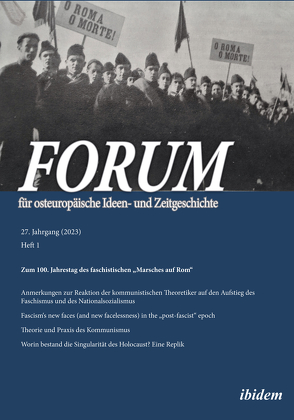
[Over] the last decade there has emerged a growing explicit (theoretically formulated) or tacit (pragmatic) acceptance by Anglophone academics working in the field that fascism’s ineliminable core is made up of the vision of a regenerated political culture and national community brought about in a post-liberal age. Inevitably, such a consensus can never be total and there are academics working in fascist studies who continue to apply a different ideal type of fascism, some of whom express deep scepticism about the very existence of an area of convergence on the centrality to fascism of an ultra-nationalist myth of rebirth. The most cited version of the consensus applied by academics who are sympathetic to it is the highly synthetic formula that I used to encapsulate my own ideal type: ‘Fascism is a political ideology whose mythic core in its various permutations is a palingenetic form of populist ultra-nationalism …
The totalitarian movements represented by the PNF and the NSDAP and the totalitarian regimes that they underpinned became the role model for all revolutionary nationalists in the inter-war period and synonymous with totalitarian, mass-based revolutionary nationalism itself. This became known as ‘fascism’ after the first such movement to achieve power, namely Mussolini’s fascismo. However, it was only in Italy and Germany that the structural crisis of liberal society was profound enough to generate a genuinely charismatic form of populist politics, one which was not confined to the hard core of movement activists, but involved the particular type of consensus generated by a ‘palingenetic political community’, thereby creating the basis for a fascist regime.
(Aus dem Beitrag von Roger Griffin)
Aktualisiert: 2023-07-03
> findR *
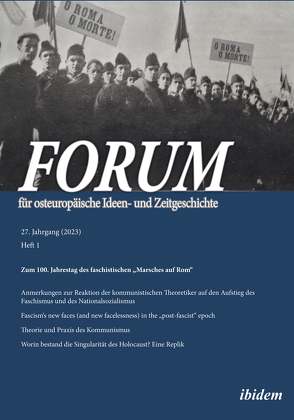
[Over] the last decade there has emerged a growing explicit (theoretically formulated) or tacit (pragmatic) acceptance by Anglophone academics working in the field that fascism’s ineliminable core is made up of the vision of a regenerated political culture and national community brought about in a post-liberal age. Inevitably, such a consensus can never be total and there are academics working in fascist studies who continue to apply a different ideal type of fascism, some of whom express deep scepticism about the very existence of an area of convergence on the centrality to fascism of an ultra-nationalist myth of rebirth. The most cited version of the consensus applied by academics who are sympathetic to it is the highly synthetic formula that I used to encapsulate my own ideal type: ‘Fascism is a political ideology whose mythic core in its various permutations is a palingenetic form of populist ultra-nationalism …
The totalitarian movements represented by the PNF and the NSDAP and the totalitarian regimes that they underpinned became the role model for all revolutionary nationalists in the inter-war period and synonymous with totalitarian, mass-based revolutionary nationalism itself. This became known as ‘fascism’ after the first such movement to achieve power, namely Mussolini’s fascismo. However, it was only in Italy and Germany that the structural crisis of liberal society was profound enough to generate a genuinely charismatic form of populist politics, one which was not confined to the hard core of movement activists, but involved the particular type of consensus generated by a ‘palingenetic political community’, thereby creating the basis for a fascist regime.
(Aus dem Beitrag von Roger Griffin)
Aktualisiert: 2023-06-29
> findR *
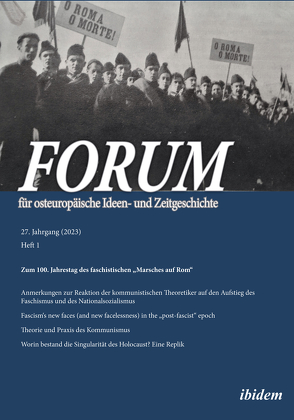
[Over] the last decade there has emerged a growing explicit (theoretically formulated) or tacit (pragmatic) acceptance by Anglophone academics working in the field that fascism’s ineliminable core is made up of the vision of a regenerated political culture and national community brought about in a post-liberal age. Inevitably, such a consensus can never be total and there are academics working in fascist studies who continue to apply a different ideal type of fascism, some of whom express deep scepticism about the very existence of an area of convergence on the centrality to fascism of an ultra-nationalist myth of rebirth. The most cited version of the consensus applied by academics who are sympathetic to it is the highly synthetic formula that I used to encapsulate my own ideal type: ‘Fascism is a political ideology whose mythic core in its various permutations is a palingenetic form of populist ultra-nationalism …
The totalitarian movements represented by the PNF and the NSDAP and the totalitarian regimes that they underpinned became the role model for all revolutionary nationalists in the inter-war period and synonymous with totalitarian, mass-based revolutionary nationalism itself. This became known as ‘fascism’ after the first such movement to achieve power, namely Mussolini’s fascismo. However, it was only in Italy and Germany that the structural crisis of liberal society was profound enough to generate a genuinely charismatic form of populist politics, one which was not confined to the hard core of movement activists, but involved the particular type of consensus generated by a ‘palingenetic political community’, thereby creating the basis for a fascist regime.
(Aus dem Beitrag von Roger Griffin)
Aktualisiert: 2023-06-29
> findR *
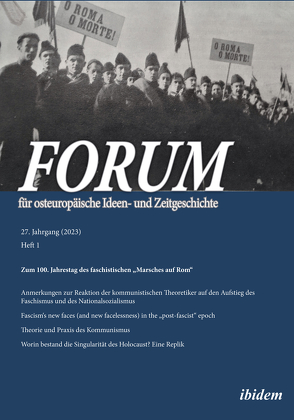
[Over] the last decade there has emerged a growing explicit (theoretically formulated) or tacit (pragmatic) acceptance by Anglophone academics working in the field that fascism’s ineliminable core is made up of the vision of a regenerated political culture and national community brought about in a post-liberal age. Inevitably, such a consensus can never be total and there are academics working in fascist studies who continue to apply a different ideal type of fascism, some of whom express deep scepticism about the very existence of an area of convergence on the centrality to fascism of an ultra-nationalist myth of rebirth. The most cited version of the consensus applied by academics who are sympathetic to it is the highly synthetic formula that I used to encapsulate my own ideal type: ‘Fascism is a political ideology whose mythic core in its various permutations is a palingenetic form of populist ultra-nationalism …
The totalitarian movements represented by the PNF and the NSDAP and the totalitarian regimes that they underpinned became the role model for all revolutionary nationalists in the inter-war period and synonymous with totalitarian, mass-based revolutionary nationalism itself. This became known as ‘fascism’ after the first such movement to achieve power, namely Mussolini’s fascismo. However, it was only in Italy and Germany that the structural crisis of liberal society was profound enough to generate a genuinely charismatic form of populist politics, one which was not confined to the hard core of movement activists, but involved the particular type of consensus generated by a ‘palingenetic political community’, thereby creating the basis for a fascist regime.
(Aus dem Beitrag von Roger Griffin)
Aktualisiert: 2023-06-21
> findR *
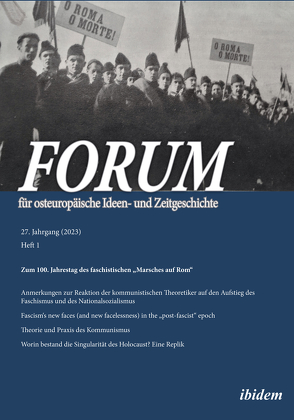
[Over] the last decade there has emerged a growing explicit (theoretically formulated) or tacit (pragmatic) acceptance by Anglophone academics working in the field that fascism’s ineliminable core is made up of the vision of a regenerated political culture and national community brought about in a post-liberal age. Inevitably, such a consensus can never be total and there are academics working in fascist studies who continue to apply a different ideal type of fascism, some of whom express deep scepticism about the very existence of an area of convergence on the centrality to fascism of an ultra-nationalist myth of rebirth. The most cited version of the consensus applied by academics who are sympathetic to it is the highly synthetic formula that I used to encapsulate my own ideal type: ‘Fascism is a political ideology whose mythic core in its various permutations is a palingenetic form of populist ultra-nationalism …
The totalitarian movements represented by the PNF and the NSDAP and the totalitarian regimes that they underpinned became the role model for all revolutionary nationalists in the inter-war period and synonymous with totalitarian, mass-based revolutionary nationalism itself. This became known as ‘fascism’ after the first such movement to achieve power, namely Mussolini’s fascismo. However, it was only in Italy and Germany that the structural crisis of liberal society was profound enough to generate a genuinely charismatic form of populist politics, one which was not confined to the hard core of movement activists, but involved the particular type of consensus generated by a ‘palingenetic political community’, thereby creating the basis for a fascist regime.
(Aus dem Beitrag von Roger Griffin)
Aktualisiert: 2023-06-21
> findR *
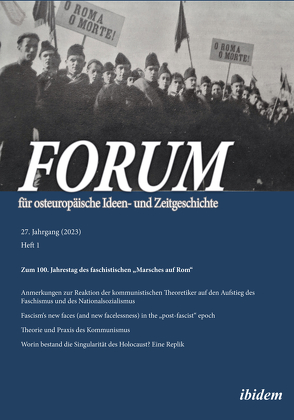
[Over] the last decade there has emerged a growing explicit (theoretically formulated) or tacit (pragmatic) acceptance by Anglophone academics working in the field that fascism’s ineliminable core is made up of the vision of a regenerated political culture and national community brought about in a post-liberal age. Inevitably, such a consensus can never be total and there are academics working in fascist studies who continue to apply a different ideal type of fascism, some of whom express deep scepticism about the very existence of an area of convergence on the centrality to fascism of an ultra-nationalist myth of rebirth. The most cited version of the consensus applied by academics who are sympathetic to it is the highly synthetic formula that I used to encapsulate my own ideal type: ‘Fascism is a political ideology whose mythic core in its various permutations is a palingenetic form of populist ultra-nationalism …
The totalitarian movements represented by the PNF and the NSDAP and the totalitarian regimes that they underpinned became the role model for all revolutionary nationalists in the inter-war period and synonymous with totalitarian, mass-based revolutionary nationalism itself. This became known as ‘fascism’ after the first such movement to achieve power, namely Mussolini’s fascismo. However, it was only in Italy and Germany that the structural crisis of liberal society was profound enough to generate a genuinely charismatic form of populist politics, one which was not confined to the hard core of movement activists, but involved the particular type of consensus generated by a ‘palingenetic political community’, thereby creating the basis for a fascist regime.
(Aus dem Beitrag von Roger Griffin)
Aktualisiert: 2023-06-21
> findR *
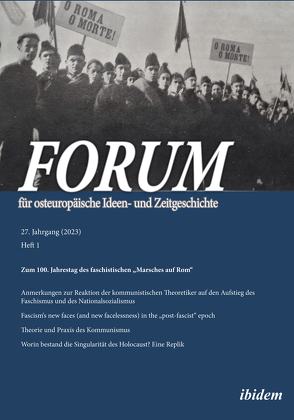
[Over] the last decade there has emerged a growing explicit (theoretically formulated) or tacit (pragmatic) acceptance by Anglophone academics working in the field that fascism’s ineliminable core is made up of the vision of a regenerated political culture and national community brought about in a post-liberal age. Inevitably, such a consensus can never be total and there are academics working in fascist studies who continue to apply a different ideal type of fascism, some of whom express deep scepticism about the very existence of an area of convergence on the centrality to fascism of an ultra-nationalist myth of rebirth. The most cited version of the consensus applied by academics who are sympathetic to it is the highly synthetic formula that I used to encapsulate my own ideal type: ‘Fascism is a political ideology whose mythic core in its various permutations is a palingenetic form of populist ultra-nationalism …
The totalitarian movements represented by the PNF and the NSDAP and the totalitarian regimes that they underpinned became the role model for all revolutionary nationalists in the inter-war period and synonymous with totalitarian, mass-based revolutionary nationalism itself. This became known as ‘fascism’ after the first such movement to achieve power, namely Mussolini’s fascismo. However, it was only in Italy and Germany that the structural crisis of liberal society was profound enough to generate a genuinely charismatic form of populist politics, one which was not confined to the hard core of movement activists, but involved the particular type of consensus generated by a ‘palingenetic political community’, thereby creating the basis for a fascist regime.
(Aus dem Beitrag von Roger Griffin)
Aktualisiert: 2023-06-21
> findR *
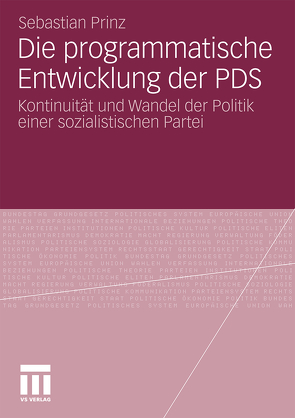
Von Anfang an war das Verhältnis von Theorie und Praxis sowohl der erkenntnistheoretische Angelpunkt als auch das politische Dilemma der marxistischen Theorie. Von Anfang war klar, dass es sich bei den beiden Begriffen um weitgehend inkompatible Kategorien handelt. So wie Denken und Handeln im realen Leben zusammengeführt werden müssen, um als Einheit wirksam werden zu können, so müssen auch Theorie und Praxis zusammengeführt werden. Erst die Einheit von Denken und Handeln konstituiert eine lebendige Biographie. In Gesellschaften, die von Ritus und Mythos getragen sind, entsteht die Einheit von Theorie und Praxis - der individuellen Biographie vergleichbar - scheinbar naturwüchsig. Die Einheit von Theorie und Praxis aber lässt sich in komplexen Gesellschaften nur als Artefakt, als soziales Konstrukt realisieren. Sie ist damit Ausdruck politischen Denkens und politischen Handelns. In modernen, von immer schnelleren Umbrüchen markierten Gesellschaften wird der soziale Wandel zur zentralen politischen Aufgabe. Das konstituiert sowohl eine begriffliche als auch eine politische, als auch schließlich eine humanitäre Aufgabe. Die Moderne muss die Produktion - eigentlich die Produkte - des Wandels immer neu und immer häufiger justieren. Woanders hat man ein solches Tun „self-management“ genannt. Auch für den Marxismus wird daher das Management des sozialen Wandels – gelegentlich verkürzt Revolution genannt - zu ihrer zentralen Aufgabe. Das erklärt die vielfältigen und differenzierten Konzepte, auch die vielen Polemiken und Leidenschaften, die der Marxismus dazu entwickelt hat. Viele davon haben bekanntlich in den Gulag geführt.
Aktualisiert: 2023-06-06
> findR *
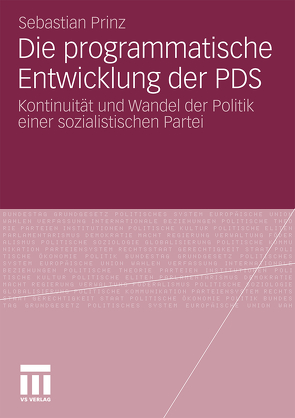
Von Anfang an war das Verhältnis von Theorie und Praxis sowohl der erkenntnistheoretische Angelpunkt als auch das politische Dilemma der marxistischen Theorie. Von Anfang war klar, dass es sich bei den beiden Begriffen um weitgehend inkompatible Kategorien handelt. So wie Denken und Handeln im realen Leben zusammengeführt werden müssen, um als Einheit wirksam werden zu können, so müssen auch Theorie und Praxis zusammengeführt werden. Erst die Einheit von Denken und Handeln konstituiert eine lebendige Biographie. In Gesellschaften, die von Ritus und Mythos getragen sind, entsteht die Einheit von Theorie und Praxis - der individuellen Biographie vergleichbar - scheinbar naturwüchsig. Die Einheit von Theorie und Praxis aber lässt sich in komplexen Gesellschaften nur als Artefakt, als soziales Konstrukt realisieren. Sie ist damit Ausdruck politischen Denkens und politischen Handelns. In modernen, von immer schnelleren Umbrüchen markierten Gesellschaften wird der soziale Wandel zur zentralen politischen Aufgabe. Das konstituiert sowohl eine begriffliche als auch eine politische, als auch schließlich eine humanitäre Aufgabe. Die Moderne muss die Produktion - eigentlich die Produkte - des Wandels immer neu und immer häufiger justieren. Woanders hat man ein solches Tun „self-management“ genannt. Auch für den Marxismus wird daher das Management des sozialen Wandels – gelegentlich verkürzt Revolution genannt - zu ihrer zentralen Aufgabe. Das erklärt die vielfältigen und differenzierten Konzepte, auch die vielen Polemiken und Leidenschaften, die der Marxismus dazu entwickelt hat. Viele davon haben bekanntlich in den Gulag geführt.
Aktualisiert: 2023-06-06
> findR *
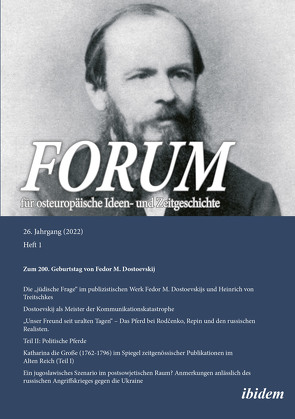
Themen der Ausgabe sind:
- Die „jüdische Frage“ im publizistischen Werk Fedor M. Dostoevskijs und Heinrich von Treitschkes
- Dostoevskij als Meister der Kommunikationskatastrophe
- „Unser Freund seit uralten Tagen“ – Das Pferd bei Rodèenko, Repin und den russischen Realisten.
Teil II: Politische Pferde
- Katharina die Große (1762-1796) im Spiegel zeitgenössischer Publikationen im Alten Reich (Teil I)
- Ein jugoslawisches Szenario im postsowjetischen Raum? Anmerkungen anlässlich des russischen Angriffskrieges gegen die Ukraine
Aus dem Beitrag von Eva Daniela Seibel:
Ein Vergleich, den Katharina II. auch selbst angestrebt hatte, war der mit demjenigen Monarchen, der dem aufgeklärten Herrscherideal in den Augen der Zeitgenossen in vielem sehr nahe kam. In einem Wettbewerb, in dem es um das Prestige des Landes sowie das Ansehen des Herrschers ging, forderte „[a]ls Jüngere an Jahren (…) Katharina den Titelverteidiger, den roi-philosophe, Friedrich den Großen, heraus [und] mit zunehmendem Alter hatte er Mühe diese Konkurrenz zu bestehen“ (Claus Scharf). Öffentlichkeitswirksam begann die Kaiserin nicht nur mit Voltaire einen Briefwechsel, sondern warb um die Gunst einer Reihe von aufgeklärten Persönlichkeiten. Letztendlich bekam die russische Kaiserin die öffentliche Bewunderung für ihre Reformen, die selbst in den cultivirtesten [Reichen], unüberwindliche Schwierigkeiten gefunden haben würden (Magnus Alopäus). Man gestand ihr zu, dass es in einem Land wie Russland „unvergleichlich größere Aufgaben [waren], als sie der aufgeklärte Preußenkönig bei seinem Herr-schafts¬antritt vorgefunden hatte.“ (Scharf) So bedachte der preußische Professor Franz Christoph Jetze die Kaiserin mit einer Antonomasie, die bisher dem Preußenkönig vorbehalten war, indem er Katharina II. als gekrönte Philosophin glorifizierte. …
Hier hatte sich auch ein wesentliches Bewertungskriterium gewandelt. Erschienen ihre Vorgängerinnen gleichsam als Schülerinnen des Westens, welche die Transformation des Russischen Staates nach westeuropäischem Vorbild voranzubringen hatten, so war Katharina II. aus dieser Rolle herausgetreten. Jetzt konnten eine russische Herrscherin und ihre Reformpolitik als mustergültige Herrschaft verehrt werden und Westeuropa als Vorbild dienen.
Aktualisiert: 2022-09-06
Autor:
Gunter Dehnert,
Holger Kuße,
Nikolaus Lobkowicz,
Leonid Luks,
Sebastian Prinz,
Anne Rennert,
Edmund Rennert,
Alexei Rybakow,
Eva Daniela Seibel,
Marina Tsoi,
Andreas Umland
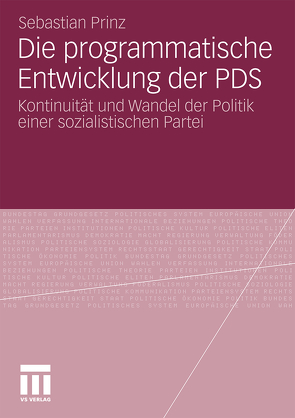
Von Anfang an war das Verhältnis von Theorie und Praxis sowohl der erkenntnistheoretische Angelpunkt als auch das politische Dilemma der marxistischen Theorie. Von Anfang war klar, dass es sich bei den beiden Begriffen um weitgehend inkompatible Kategorien handelt. So wie Denken und Handeln im realen Leben zusammengeführt werden müssen, um als Einheit wirksam werden zu können, so müssen auch Theorie und Praxis zusammengeführt werden. Erst die Einheit von Denken und Handeln konstituiert eine lebendige Biographie. In Gesellschaften, die von Ritus und Mythos getragen sind, entsteht die Einheit von Theorie und Praxis - der individuellen Biographie vergleichbar - scheinbar naturwüchsig. Die Einheit von Theorie und Praxis aber lässt sich in komplexen Gesellschaften nur als Artefakt, als soziales Konstrukt realisieren. Sie ist damit Ausdruck politischen Denkens und politischen Handelns. In modernen, von immer schnelleren Umbrüchen markierten Gesellschaften wird der soziale Wandel zur zentralen politischen Aufgabe. Das konstituiert sowohl eine begriffliche als auch eine politische, als auch schließlich eine humanitäre Aufgabe. Die Moderne muss die Produktion - eigentlich die Produkte - des Wandels immer neu und immer häufiger justieren. Woanders hat man ein solches Tun „self-management“ genannt. Auch für den Marxismus wird daher das Management des sozialen Wandels – gelegentlich verkürzt Revolution genannt - zu ihrer zentralen Aufgabe. Das erklärt die vielfältigen und differenzierten Konzepte, auch die vielen Polemiken und Leidenschaften, die der Marxismus dazu entwickelt hat. Viele davon haben bekanntlich in den Gulag geführt.
Aktualisiert: 2023-03-15
> findR *
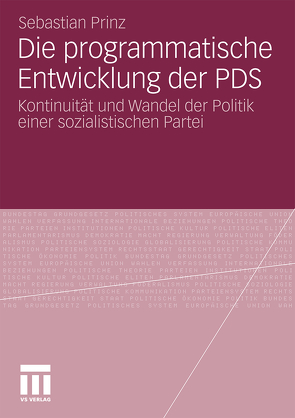
Von Anfang an war das Verhältnis von Theorie und Praxis sowohl der erkenntnistheoretische Angelpunkt als auch das politische Dilemma der marxistischen Theorie. Von Anfang war klar, dass es sich bei den beiden Begriffen um weitgehend inkompatible Kategorien handelt. So wie Denken und Handeln im realen Leben zusammengeführt werden müssen, um als Einheit wirksam werden zu können, so müssen auch Theorie und Praxis zusammengeführt werden. Erst die Einheit von Denken und Handeln konstituiert eine lebendige Biographie. In Gesellschaften, die von Ritus und Mythos getragen sind, entsteht die Einheit von Theorie und Praxis - der individuellen Biographie vergleichbar - scheinbar naturwüchsig. Die Einheit von Theorie und Praxis aber lässt sich in komplexen Gesellschaften nur als Artefakt, als soziales Konstrukt realisieren. Sie ist damit Ausdruck politischen Denkens und politischen Handelns. In modernen, von immer schnelleren Umbrüchen markierten Gesellschaften wird der soziale Wandel zur zentralen politischen Aufgabe. Das konstituiert sowohl eine begriffliche als auch eine politische, als auch schließlich eine humanitäre Aufgabe. Die Moderne muss die Produktion - eigentlich die Produkte - des Wandels immer neu und immer häufiger justieren. Woanders hat man ein solches Tun „self-management“ genannt. Auch für den Marxismus wird daher das Management des sozialen Wandels – gelegentlich verkürzt Revolution genannt - zu ihrer zentralen Aufgabe. Das erklärt die vielfältigen und differenzierten Konzepte, auch die vielen Polemiken und Leidenschaften, die der Marxismus dazu entwickelt hat. Viele davon haben bekanntlich in den Gulag geführt.
Aktualisiert: 2023-04-04
> findR *
MEHR ANZEIGEN
Bücher von Prinz, Sebastian
Sie suchen ein Buch oder Publikation vonPrinz, Sebastian ? Bei Buch findr finden Sie alle Bücher Prinz, Sebastian.
Entdecken Sie neue Bücher oder Klassiker für Sie selbst oder zum Verschenken. Buch findr hat zahlreiche Bücher
von Prinz, Sebastian im Sortiment. Nehmen Sie sich Zeit zum Stöbern und finden Sie das passende Buch oder die
Publiketion für Ihr Lesevergnügen oder Ihr Interessensgebiet. Stöbern Sie durch unser Angebot und finden Sie aus
unserer großen Auswahl das Buch, das Ihnen zusagt. Bei Buch findr finden Sie Romane, Ratgeber, wissenschaftliche und
populärwissenschaftliche Bücher uvm. Bestellen Sie Ihr Buch zu Ihrem Thema einfach online und lassen Sie es sich
bequem nach Hause schicken. Wir wünschen Ihnen schöne und entspannte Lesemomente mit Ihrem Buch
von Prinz, Sebastian .
Prinz, Sebastian - Große Auswahl an Publikationen bei Buch findr
Bei uns finden Sie Bücher aller beliebter Autoren, Neuerscheinungen, Bestseller genauso wie alte Schätze. Bücher
von Prinz, Sebastian die Ihre Fantasie anregen und Bücher, die Sie weiterbilden und Ihnen wissenschaftliche Fakten
vermitteln. Ganz nach Ihrem Geschmack ist das passende Buch für Sie dabei. Finden Sie eine große Auswahl Bücher
verschiedenster Genres, Verlage, Schlagworte Genre bei Buchfindr:
Unser Repertoire umfasst Bücher von
Sie haben viele Möglichkeiten bei Buch findr die passenden Bücher für Ihr Lesevergnügen zu entdecken. Nutzen Sie
unsere Suchfunktionen, um zu stöbern und für Sie interessante Bücher in den unterschiedlichen Genres und Kategorien
zu finden. Neben Büchern von Prinz, Sebastian und Büchern aus verschiedenen Kategorien finden Sie schnell und
einfach auch eine Auflistung thematisch passender Publikationen. Probieren Sie es aus, legen Sie jetzt los! Ihrem
Lesevergnügen steht nichts im Wege. Nutzen Sie die Vorteile Ihre Bücher online zu kaufen und bekommen Sie die
bestellten Bücher schnell und bequem zugestellt. Nehmen Sie sich die Zeit, online die Bücher Ihrer Wahl anzulesen,
Buchempfehlungen und Rezensionen zu studieren, Informationen zu Autoren zu lesen. Viel Spaß beim Lesen wünscht Ihnen
das Team von Buchfindr.












